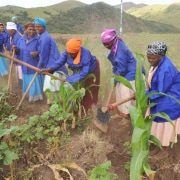|
Getting your Trinity Audio player ready...
|
Image: GroundUp
Corruption Watch has built up a substantial body of work in helping to expose and address corruption in the land sector. For several years now we have been part of an international research project on how corruption affects the most marginalised of our communities in this regard – our field work in 2023 in the Western Cape, focusing on farm worker equity schemes, led us to farm communities which have been deceived, overlooked, and discriminated against by both private farmers and the provincial and national agriculture departments. For years, these workers have suffered the violation of their constitutional human rights.
In many of those communities, we found, women played a vital activist role, and they did again this week, when over 200 farm women marched to Parliament to protest the continued use of dangerous pesticides which have been banned elsewhere in the world, though not here. The right to an environment that does not harm one’s health or wellbeing is guaranteed in South Africa’s Bill of Rights.
The Department of Agriculture, Land Reform and Rural Development had given notice that it intended to conform to an international assessment of risks to human health from exposure to active ingredients and their formulations that “meet the criteria of carcinogenicity, mutagenicity and reproductive (CMR) toxicity categories 1A or 1B for the Globally Harmonized System (GHS) of classification and labelling”.
In the department’s letter of notice to discontinue use of such poisons, published just over two years ago, it stated that: “the Registrar intends to prohibit the use of active ingredients, and their formulations that meets the criteria of CMR categories 1A or 1B of the GHS as from 01 June 2024. This period provided is to allow a gradual phase-out of products that falls within that criteria”.
However, the deadline has come and gone and farm workers’ health is still under threat, because the intended prohibition has not happened. Rather, the department is advocating for exemptions to the use of these poisons, while the farm women say they have been excluded from the very decision-making process that affects their health directly.
Read the account below, as published by GroundUp:
By Liezl Human
First published on GroundUp
- Farm women marched to Parliament on Tuesday in response to government’s decision not to phase out pesticides, as promised.
- Instead the Department of Agriculture, Land Reform and Rural Development has gazetted guidelines for exemptions on pesticide use.
- The farm workers want a ban on pesticides widely used in South Africa but banned elsewhere in the world.
- Stun grenades were thrown at the women outside Parliament when they breached the police line.
Over 200 farm women braved the rain and cold to march to Parliament in Cape Town on Tuesday, 4 June 2024.
Under the banner of the Women on Farms Project (WFP), they carried placards that read: “Don’t poison us” and “Ban pesticides now”.
The protest was over a decision by the Department of Agriculture, Land Reform and Rural Development to renege on a promise to phase out harmful pesticides by June 2024.
Police threw stun grenades at the women after they broke past the police line at the gates of Parliament. Some women threw their placards over the gates, some of which were thrown back. They also threw water at the police. Using their shields, police pushed the women back.
In April 2022, the department gave notice that certain pesticides, including chemicals linked to cancer, genetic mutations, and harmful to reproductive health, would be phased out and banned by this month.
In September 2022, we reported that the department was in talks with the industry about this.
But instead of phasing out pesticides, the department recently gazetted guidelines for applicants to apply for “derogation” of a “substance of concern” and be granted an exemption to use the pesticides.
In a memorandum, the Women on Farms Project (WFP) said the guidelines do not provide the criteria the department’s registrar will use to decide on the registration of pesticides; that there is an “unreasonably short” period of 30 days to provide any comments on applications; and that there is no appeals process for interested parties, such as farm workers, after a decision is made.
“This move allows rich, resourced, and powerful corporations to undermine the safety and well-being of our agricultural workers and communities,” the memorandum reads.
The memorandum demands that pesticides already banned in the EU also be banned in South Africa, and that the registrar, Jonathan Madzunga, meet with the workers urgently.
The farm women say the new regulations were made without consulting them.
Colette Solomon, director at WFP, said farm workers have been “totally excluded now from the decision-making”. They “feel like their health interests have been totally overlooked”.
“To us it really does seem like it is a buckling of government to the interests of commercial farmers and, more importantly, to pesticide companies,” said Solomon.
“We won’t let them forget about the most important people in the equation – farm workers and dwellers,” she told the crowd.
Seasonal farm worker Engela Masobeng said: “You work here and right there the tractor is spraying.” If farm workers can grow crops without pesticides, then farmers also can, she said.
No one received the memorandum at Parliament.
The Department of Agriculture, Land Reform and Rural Development had not responded to GroundUp’s questions at the time of publication.




